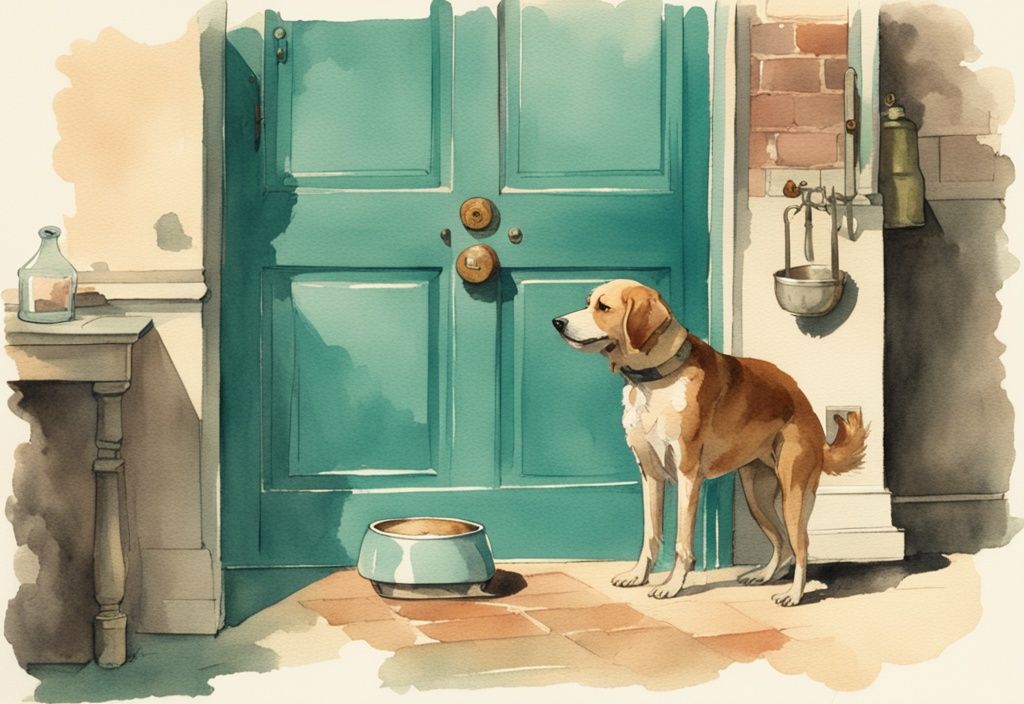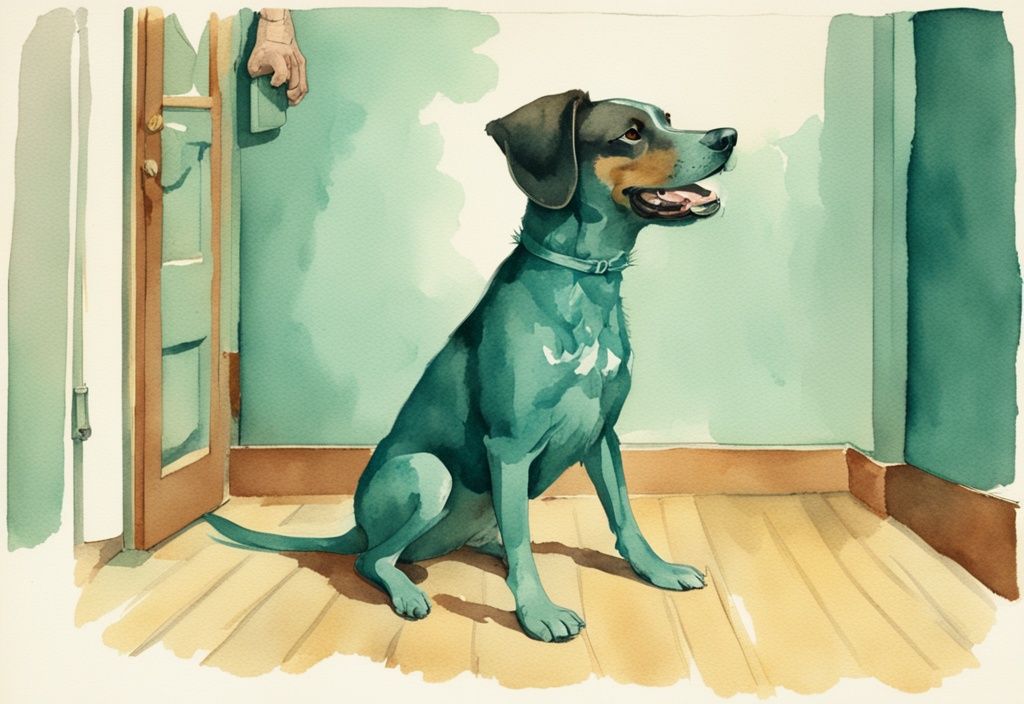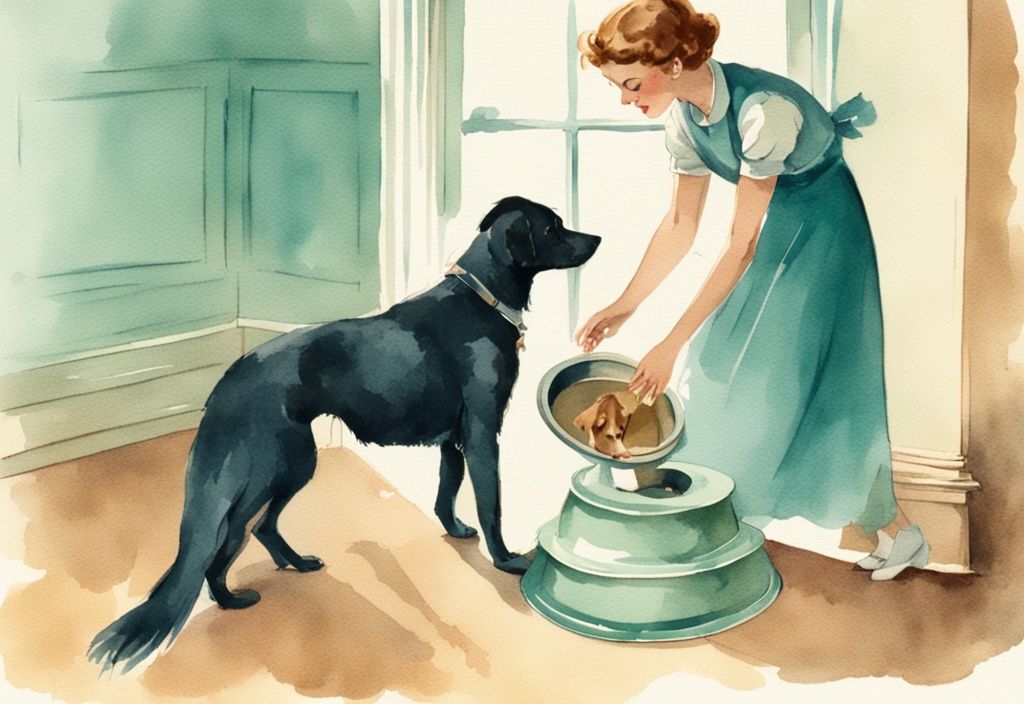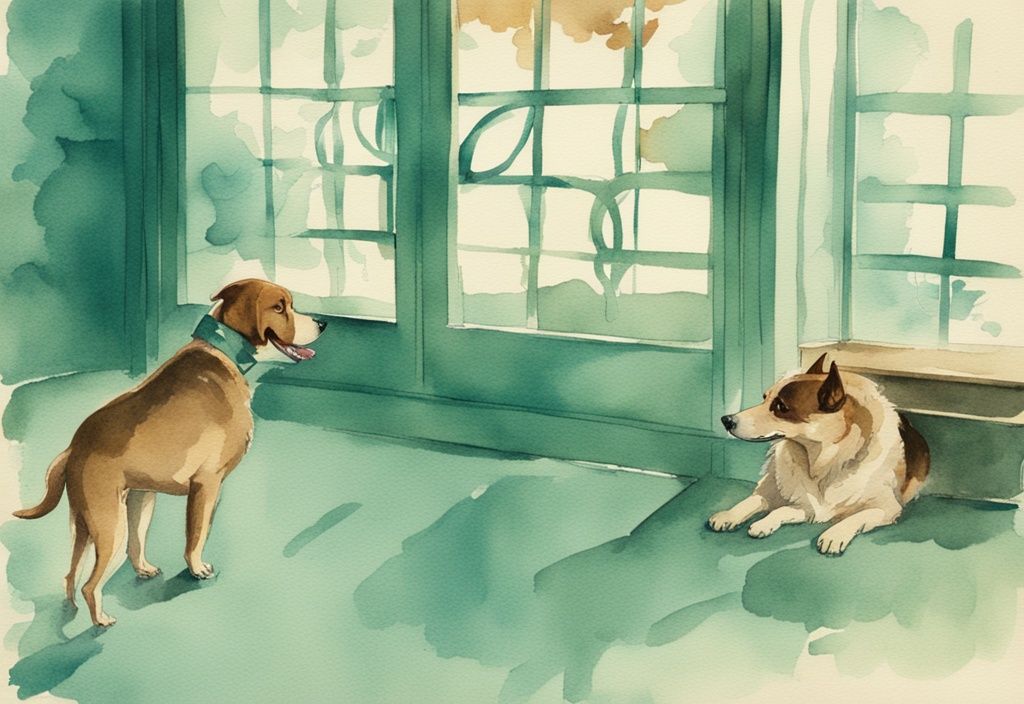Ever watch your dog do something a bit peculiar, and wonder, “Why is my dog acting weird?” Us dog lovers hate seeing our furry friends distressed or behaving oddly. As much as love speaks volumes, it doesn’t translate to understanding canine language. You’re here because you’re troubled about your best friend’s strange behavior and want answers, and rightly so.
This piece aims to offer insight into our dogs’ peculiar behaviors – from anxiety bouts to sudden aggression. We’ll delve into the causes, be it stress, environmental changes, or health-related issues. And most importantly, we will champion actionable solutions to ensure our fur babies continue living their best lives.
So, buckle up and prepare to enter the intriguing world of canine conduct. Your barking buddy will appreciate your newfound understanding!
Recognizing the Signs of Unusual Dog Behavior
Dogs, just like humans, can sometimes act out of character. These behavioral changes might be their way of communicating underlying issues.
Unexpected Anxiety and Stress
Why is my dog acting weird? Dogs can exhibit weird behaviors when they are experiencing anxiety and stress. You might notice behaviors such as pacing, panting, drooling, and hiding. These signs can be triggered by changes in their routine or environment, and if your dog is experiencing anxiety, you can find helpful information on treating it at https://www.akc.org/expert-advice/health/treating-dog-anxiety/. A once comfortable dog might start to make less eye contact, yawn frequently, or bark excessively. It’s important to pinpoint these behaviors as they can indicate that your dog is not feeling secure or relaxed.
Imagine your dog suddenly hiding behind the couch or incessantly pacing around the house. It’s heartbreaking to see our furry friends in distress. Changes in your home or daily routine can often be the culprits. Pay attention to their body language; decreased eye contact or excessive yawning could be their way of saying, “I’m stressed!”
Unexplained Fear and Aggression
Fear and aggression in dogs can often appear suddenly, leaving owners puzzled and asking, why is my dog acting weird? Pain, trauma, or a lack of adequate socialization can lead to these behavioral changes. Sometimes, underlying health issues are to blame when a normally gentle dog starts biting or snapping unexpectedly. Observing when and where these aggressive behaviors occur can help you identify specific triggers and seek appropriate solutions.
It’s concerning when your typically sweet pup starts showing signs of aggression. It could be as simple as an unseen injury or an encounter that scared them.
Keep an eye out for those moments of sudden fear; pinpointing the triggers can help in finding the right solution.
Changes in Eating and Drinking
Noticing that your dog suddenly eats less or drinks more can be alarming and make you wonder, why is my dog acting weird? Such changes in appetite and water intake can signal underlying health issues like digestive problems, dental diseases, kidney disease, or diabetes. Close monitoring of your dog’s eating and drinking habits can help you catch these signs early and seek veterinary advice promptly.
Changes in eating or drinking habits often sound an alarm for health issues. One minute your dog is gobbling up their food, and the next, they’re barely touching it. This shift could be signaling anything from dental problems to more serious health concerns. Always keep a close eye—early detection could be a lifesaver.
Shifts in Sleep Patterns
If you find yourself asking, why is my dog acting weird at night, erratic sleep patterns might be to blame. Dogs may sleep poorly due to aging, stress, or changes in their environment. Signs of discomfort, pain, or anxiety can significantly impact your dog’s sleep quality. Ensuring a comfortable and secure sleeping area may help alleviate some of these issues.
Have you noticed your dog restless at night, unable to find a comfortable spot to snooze? Adjustments in their sleep could be due to various reasons including stress or even a new piece of furniture in their space. Creating a calm and secure sleeping environment can do wonders for their restful nights.
Non-stop Barking and Destructive Actions
Persistent barking and destructive behaviors can be confusing for dog owners who wonder, why is my dog acting weird? These actions are often manifestations of underlying anxiety, boredom, or a bid for attention. Lack of physical and mental stimulation can exacerbate these issues. Regular exercise, interactive play, and proper training can help address and mitigate these behaviors by giving your dog a healthy outlet for their energy and attention needs.
Non-stop barking or chewing up your favorite shoes can drive anyone mad. Usually, these behaviors stem from an anxious or bored pup. Turning this around can be as simple as increasing their playtime or adding new fun activities to their day. It’s a win-win—happy pup, happy you!

Exploring Possible Reasons Behind Your Dog’s Weird Behavior
If you’ve ever wondered, “Why is my dog acting weird?”, you’re certainly not alone. Our furry friends sometimes exhibit odd behaviors that leave us scratching our heads. From medical conditions to environmental changes, there are various explanations for your dog’s peculiar actions. Let’s dive deep into the potential reasons.
Medical Conditions Impacting Behavior
Neurological Disorders and Its Symptoms
Neurological disorders like seizures, epilepsy, or brain tumors can drastically influence your dog’s behavior. Signs to watch for include confusion, repetitive circling, and head pressing against walls. These symptoms indicate a need for prompt veterinary evaluation to diagnose and manage potential brain-related conditions.
Effect of Infections and Pain on Behavior
Infections and physical pain can cause noticeable changes in your dog’s behavior. Ear infections may lead to excessive scratching, while dental issues could result in reluctance to eat or play. Injuries might cause limping and whimpering. Regular vet check-ups are crucial to identify and treat such issues early for your dog’s well-being.
Behavioral Changes Triggered by Aging
As our dogs get older, they can face cognitive decline that leads to confusion and disorientation. This might show up as increased aggression, frequent barking, and pronounced anxiety. Consulting a vet helps manage these age-related changes, ensuring your senior dog stays comfortable and happy.
Poisoning and Toxicity: How It Affects Behavior
Ingesting toxic substances like chocolate or certain plants can significantly alter a dog’s behavior. Symptoms of poisoning include drooling, shaking, vomiting, and lethargy. Immediate veterinary attention is crucial to prevent serious health consequences and ensure your dog’s safety.
Food Allergies and Dietary Changes: Surprising Effects on Behavior
Food allergies can lead to itching, anxiety, and gastrointestinal issues, markedly affecting your dog’s behavior. Switching diets can also cause temporary behavior changes as your dog adapts. It’s vital to monitor your dog’s response to new foods and consult your vet to address any adverse reactions promptly.
Stress and Environmental Triggers
The Impact of Shifting Routines or Environments
Changes like moving homes, altering daily routines, or introducing new family members can cause significant stress for your dog. This might result in acting out or becoming withdrawn. Maintaining consistency in routines helps reduce this stress and stabilize your dog’s behavior.
How Weather Conditions and Noise May Cause Strange Behaviors
Weather events like thunderstorms and loud noises from fireworks can trigger fear and anxiety in dogs. Behavioral responses might include hiding, whimpering, or physical signs of stress like shaking. Creating a calm environment and exploring anxiety remedies can help mitigate these reactions.
Dogs’ Reaction to Hormonal Changes
Hormonal fluctuations in un-neutered or un-spayed dogs can influence behavior significantly. Increased aggression, excessive marking, and mood swings are common signs. Discussing the benefits of neutering or spaying with your vet can help manage these behavioral issues effectively.
Attention-seeking Behavior: What’s Behind It?
Behaviors such as excessive barking or destructive actions often stem from a desire for attention. Ensure your dog receives adequate interaction, playtime, and companionship. Address negative attention-seeking behavior by ignoring it and rewarding positive behaviors, thereby guiding your dog towards more acceptable actions.
Lack of Physical and Mental Stimulation Symptoms
Dogs require sufficient physical exercise and mental stimulation to prevent boredom-related behaviors. Signs of insufficient activity include destructive behavior, hyperactivity, and furniture chewing. Engaging your dog in regular exercise routines and mental challenges, like puzzle toys, can significantly improve their behavior and overall well-being.
Weird Dog Behaviors Explained
Why Dogs Have Random Energy Bursts (Zoomies)
Ever wonder why your dog suddenly zooms around the house like they’re on an invisible racetrack? These sudden, random bursts of energy, affectionately known as “zoomies,” are a dog’s way of releasing pent-up energy. Your pup might get the zoomies from sheer joy, excitement, or sometimes to relieve stress. Imagine the thrill they must feel after a refreshing bath! While zoomies are generally harmless, it’s essential to ensure there’s plenty of space and no obstacles to prevent injuries. Embracing and understanding these wild, joyful runs can add a beautiful layer to your bond with your dog.

Underlying Causes of Dogs Spinning in Circles
Seeing your dog spin in circles might be quite the spectacle, but it’s essential to dig into why they do this. Sure, it can be a fun way to express happiness or excitement. However, spinning can sometimes point to health issues like ear infections or even neurological problems. Keep an eye on how often and in what context your furball spins. If the spinning is frequent or appears compulsive, a vet consultation can help rule out serious conditions.
Frequent Yawning in Dogs: What Does It Mean?
Yawning isn’t just for sleepyheads; your dog’s yawns can tell quite a story. Frequent yawning often signals fear, anxiety, or discomfort rather than sleepiness. Take a look around—could something in their environment be stressing them out? Creating a calm and reassuring setting works wonders. But don’t disregard persistent yawning. If it continues, a veterinary consultation is advisable to check for underlying health issues and devise a plan to ease their anxiety.
Does Eating Grass Indicate Something is Wrong?
It can be puzzling to see your dog munching on grass as if they were a tiny cow. While this might look odd, grass eating is relatively common among dogs. They do it to supplement their diet with nutrients or to soothe an upset stomach. Don’t worry if this is occasional; it’s usually harmless. But if grass consumption turns into a frequent habit, a visit to the vet is warranted to rule out digestive issues and ensure your dog’s diet is balanced.
Why is My Dog Suddenly Lethargic?
When your typically energetic dog suddenly becomes lethargic, it can be downright alarming. This drop in energy often hints that something is amiss—food poisoning, illness, or perhaps allergies. Keeping a close watch on their activity levels and seeking prompt veterinary care is crucial. An immediate medical evaluation will help identify and address the root cause, ensuring your pup gets the treatment needed to bounce back to their lively self. If you’re dealing with odors at home, discover effective solutions in our guide on how to get dog smell out of a carpet.
Excessive Panting: When Should I Be Concerned?
Sure, dogs pant to cool down, but when does it become too much? Excessive panting can be a red flag, indicating pain, discomfort, or underlying diseases. Keep an eye on when and how often your dog pants. Ensuring they stay hydrated and cool is essential, but if the panting persists, it’s time for a vet check-up. Identifying and treating any health issues causing this distressing behavior is vital.
The Reasons Behind a Dog’s Excessive Chewing or Licking
Why does your dog chew or lick everything in sight? This behavior can be due to anxiety, allergies, boredom, or even pain. Unraveling the root cause is key. Does your dog need more chew toys or perhaps a change in diet to address allergies? If the behavior seems compulsive, a vet’s evaluation is necessary. Understanding why your dog acts out in these ways allows you to provide effective solutions.
What Makes a Dog Suddenly Aggressive?
When your sweet pup suddenly shows aggression, it’s a cause for concern. This can arise from fear, insufficient socialization, or even pain due to illness or injury. Pinpointing the triggers and evaluating circumstances is crucial. Seeking professional behavioral training and a comprehensive vet examination can mitigate these aggressive tendencies. By understanding the underlying reasons, you can better manage and correct your dog’s behavior.
By diving into these behaviors and their potential causes, you’ll gain a clearer understanding of why your dog might be acting weird. Taking appropriate steps will ensure their health and happiness, reinforcing that wonderful bond you share.
What Should I Do If My Dog Is Acting Weird
When our furry friends start behaving oddly, it’s natural to worry, “why is my dog acting weird?” To ease that anxiety, let’s dive into some practical steps to help our beloved pups.
When Should I Consult a Veterinarian?
If you’re pondering, “why is my dog acting weird?” there are times when immediate veterinary attention is crucial. Sudden or severe behavior changes, like unusual lethargy, unexpected aggression, or compulsive actions, can signal serious issues. Observable signs of potential poisoning, evident pain, or neurological problems necessitate prompt veterinary care. Regular vet visits are indispensable for early detection and treatment, ensuring your pup stays healthy and happy.
Why Keeping Record of Your Dog’s Behavior is Important
Maintaining detailed records of your dog’s behavior can be a game-changer when you’re figuring out why your dog is acting weird. These logs help track behavior patterns and identify changes more effectively. Note down any shifts in eating, drinking, sleeping habits, and overall mood. This comprehensive documentation can offer your vet invaluable insights into what’s troubling your furry friend.
Maintaining a Consistent Routine for Your Dog
A steady routine is often the secret sauce to preventing stress and anxiety in dogs. Stick to regular feeding, walking, and playtime schedules to create a predictability that soothes your pup. By keeping things consistent, you can often mitigate behaviors linked to anxiety, answering the ever-pressing question of why your dog might be acting weird.
Exercise and Mental Stimulation: Essential for Healthy Dog Behavior
Digital puzzle games, interactive toys, and engaging training sessions can work wonders for your dog’s mental and physical well-being. These activities help alleviate boredom and avert destructive behaviors. The right mix of physical exercise and mental stimulation can channel your dog’s energy into positive avenues, addressing those odd behaviors that catch you off-guard.
Making Your Home Safe and Comfortable for Your Dog
Your home should be a haven for your furry companion, especially when you’re trying to figure out “why is my dog acting weird.” Make sure your home is devoid of harmful plants and substances to prevent accidental poisoning. Create a cozy retreat where your pup can find solace during stressful moments. Regularly check and maintain your dog’s environment for ultimate safety and comfort.
Nutrition: Crucial for Addressing Weird Dog Behavior
Proper nutrition plays a pivotal role in your dog’s physical and mental health. Consult with your vet to tailor a balanced diet that suits your dog’s unique needs. Watch for food allergies or sensitivities that might be impacting their behavior. Good nutrition is key in squashing some of those unexplained, weird behaviors.
Professional Behavior Training and Socialization: Does My Dog Need It?
Early socialization and professional training can make a significant difference in your dog’s behavior. Using positive reinforcement techniques builds confidence and fosters good habits. If your dog continues to exhibit unusual or challenging behaviors, turning to a professional trainer can be incredibly beneficial. They offer specialized training methods, helping to answer “why is my dog acting weird” and paving the way for a closer, more fulfilling relationship with your pet.
Common Questions About Weird Dog Behavior
Why is my Dog Head-Pressing Against Walls?
One concerning aspect of why is my dog acting weird is head-pressing. This behavior, where a dog repeatedly presses its head against a wall or object, could indicate serious medical conditions like brain disease, organ disease, or toxic poisoning. Immediate veterinary care is essential to diagnose and treat the underlying issue promptly.
My Dog is Suddenly Aggressive: What Should I Do?
Sudden aggression in dogs can be alarming and may stem from various factors such as pain, fear, or environmental changes. It’s crucial first to identify any potential triggers. Consulting a veterinarian for a health evaluation is necessary, followed by professional behavioral assessment. Remember, avoid punishment and use positive reinforcement techniques to address and manage aggression effectively.

How Can I Determine if My Dog is Anxious or Stressed?
Recognizing anxiety and stress in dogs involves observing behaviors like pacing, panting, drooling, hiding, and reduced eye contact. Additional signs include increased barking and destructive actions. It’s essential to consider recent changes in the dog’s routine or environment that might be causing these anxiety symptoms. Promptly addressing these factors can alleviate stress.
Is It a Red Flag if My Dog Eats Grass?
Occasional grass eating by dogs is generally harmless and can be a normal behavior. However, if your dog consumes grass excessively, it may indicate underlying issues. Keeping a close eye on this behavior and consulting with your veterinarian is advisable if the grass-eating persists.
What Indicate that My Dog Needs to See a Vet?
Several indicators suggest that a dog needs veterinary attention, including sudden behavioral changes, persistent licking or chewing, head pressing, excessive panting, and lethargy. Unexplained aggression, significant changes in eating or drinking habits, and severe anxiety also warrant a vet visit. Regular wellness checks can help in early detection and treatment of potential health issues.
Conclusion: Understanding Your Dog’s Weird Behavior
Keyword Focus: why is my dog acting weird
Understanding why your dog is acting weird is crucial for ensuring their overall well-being. Dogs communicate through behaviors that may seem unusual but are often indicative of underlying issues. Addressing these behaviors promptly can make a significant difference in your dog’s health and happiness.
Regular vet visits form the cornerstone of maintaining your dog’s health. Routine check-ups allow for early detection of health problems that might be causing strange behavior. A balanced diet tailored to your dog’s specific nutritional needs supports both physical health and emotional stability, while regular exercise keeps your dog fit and mentally stimulated.
Creating a safe environment is essential. Remove any potential hazards, including toxic plants and substances, to protect your dog from accidental poisoning. Providing a secure, quiet space helps alleviate stress and anxiety, making your home a comforting refuge for your pet.
Early socialization and training are invaluable in preventing and managing behavioral issues. Socializing puppies helps them grow into well-adjusted adults, while consistent training using positive reinforcement fosters good behavior and strengthens your bond. If your dog shows persistent or severe behaviors, seek the help of a professional trainer to address these issues effectively.
Observing and recording your dog’s behavior can provide critical insights when discussing concerns with your veterinarian. Keep detailed notes on changes in eating, drinking, sleeping, and overall mood. This practice not only aids in diagnosing potential health issues, but also helps in tailoring strategies to manage and improve your dog’s behavior.
In conclusion, understanding why your dog is acting weird involves a combination of regular veterinary care, proper nutrition, safe and stimulating environments, and thorough behavioral observation. By staying attentive and proactive, you ensure that your furry companion remains healthy, happy, and well-adjusted.
